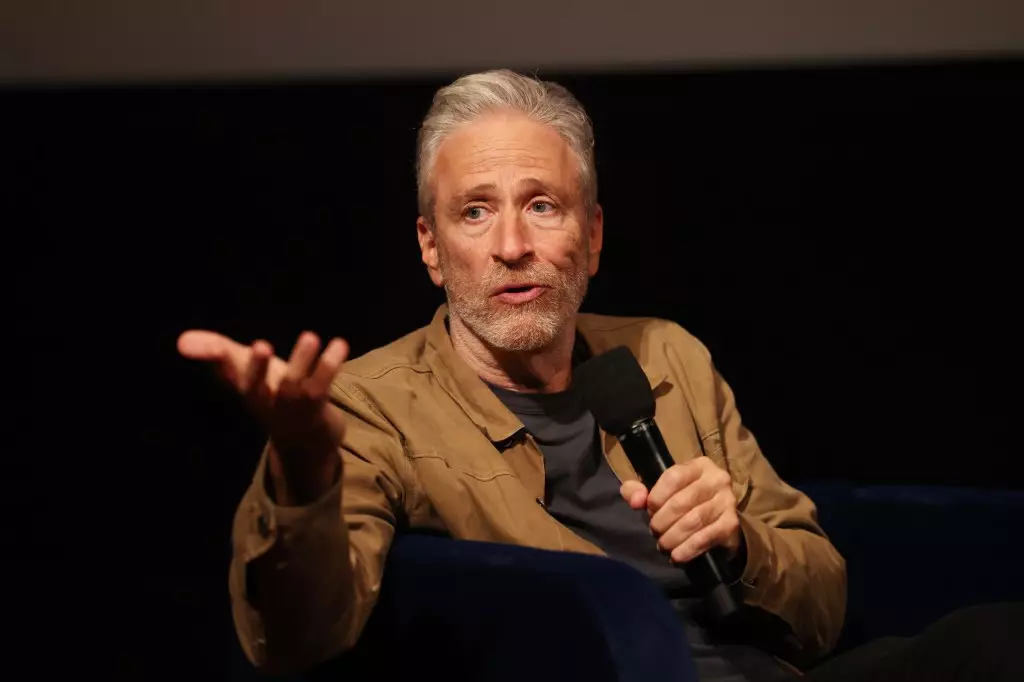In an era defined by rapid technological advancement, the entertainment industry faces a critical juncture that raises the stakes for writers across the board. Jon Stewart, the iconic former host of The Daily Show, delivered a passionate address that highlights a pressing concern: the gradual encroachment of tech giants like Apple, Netflix, and Amazon into content creation. This transformation, while undoubtedly innovative, poses a significant risk of diluting the artistry and connection that are essential to storytelling. Stewart’s assertion that “we are feeling the plate shift underneath us” encapsulates a sentiment widely shared among writers who fear for the integrity of their craft.
In this evolving landscape, writers find themselves at the mercy of corporate algorithms and cost-cutting measures that compromise their creative input. When Stewart speaks of tech companies reducing writers’ rooms to a mere two people, it underscores a troubling trend: the prioritization of efficiency over creative collaboration. Content created under such constraints lacks the depth and resonance that comes from diverse voices and collective brainstorming. The heart of Stewart’s arguments resonates with the idea that writing is not merely a profession but a craft that thrives on human connection—something that automated processes simply cannot replicate.
The Resilience of Human Connection
While technology can facilitate entertainment consumption on an unprecedented scale, it also fosters a sense of detachment. Stewart’s reflections on the growing audience’s desire for real connection during live performances reveal an underlying concern about social isolation in contemporary society. “A real need to be in that room together,” he notes, emphasizing how communal experiences are more vital than ever in a world increasingly dominated by screens. Stewart’s perspective illustrates that, despite the challenges facing writers today, there remains a glimmer of hope in our fundamental yearning for human interaction.
Moreover, Stewart urges the importance of preserving the integrity of the writer’s role in content creation. He contends that when writers are involved in the process, the final product not only benefits from their insight but also resonates with audiences on a profound level. His compliment to the team behind The Daily Show, highlighting their growth and adaptability, reinforces the notion that collaboration fosters excellence. The evolution of a writing team mirrors the journey of art itself—an ongoing process enhanced by diverse perspectives and shared experiences.
Stewart’s Optimism Amid Uncertainty
Despite the overwhelming presence of tech companies in the industry, Stewart remains optimistic about the potential for genuine human stories to resonate with audiences. This optimism stems from his belief in the enduring power of artistry infused with human emotion. While acknowledging the challenges that technology poses, he recognizes that authentic connections can transcend the confines of modern production methods. Stewart’s proclamation that “there’s something about the connection between people” serves as a powerful reminder that at the core of storytelling lies empathy and understanding.
As we stand at this crossroads where technology and artistry meet, the call for writers to reclaim their space in the creative conversation becomes ever more urgent. Jon Stewart’s heartfelt advocacy encourages a reexamination of how we approach writing, content creation, and, ultimately, our connections with one another. In a world where technology threatens to overshadow the human element, it is imperative that we champion the writers who breathe life into stories, ensuring that the craft endures in the face of overwhelming odds.
